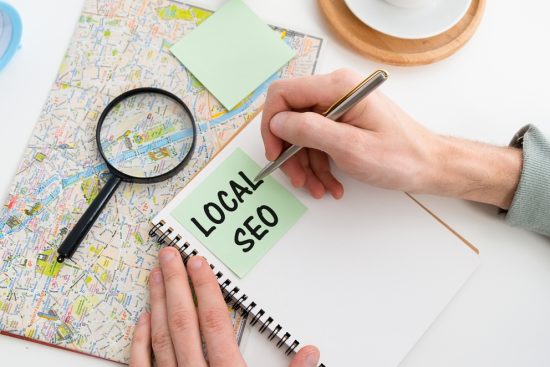Why Your Business Needs Local SEO to Get More Leads
Have you ever spent hours meticulously crafting a message-in-a-bottle only to toss it into an ocean teeming with other bottles just like yours? That’s akin to launching a business without leveraging the power of local SEO. Your message, no matter how compelling, drowns in a sea of competition, unseen by numerous potential customers waiting on the shores. But what if you could make your bottle glow in the dark? Welcome to Local SEO- your secret luminous paint! Tap into this unexploited reservoir and unlock unparalleled business potential, driving more leads than ever before! Turn your small venture into a local juggernaut that not only survives but thrives amidst fierce competition. Transform potential into prosperity – The time is now!

Understanding Local SEO
Local SEO is an effective digital marketing strategy that focuses on optimizing a business’s online presence for local searches. In simple terms, it ensures that your business appears in the top search results when someone conducts a search for a product or service in your area. While Local SEO is similar to standard SEO practices, there are a few key differences.
One of the main differences between Local SEO and general SEO is the focus on “local intent.” This means that the search results should show businesses that are relevant to the user’s physical location. For example, if someone types “pizza delivery” into Google, they are most likely looking for pizza places nearby. Therefore, Google will display local pizza places instead of those further away.
Let’s take the example of a small Italian restaurant in San Francisco. The restaurant wants to attract more customers from its local area by appearing on top of the search engine results page whenever potential customers conduct a search related to Italian food in San Francisco. By implementing proper local SEO strategies, such as registering their business with Google My Business or earning backlinks from food blogs located in San Francisco, this restaurant can increase its online visibility and improve its chances of attracting new customers.
To understand how Local SEO works, it is essential to understand the factors affecting local SEO visibility.
Factors Affecting Local SEO Visibility
Several factors affect local visibility and ranking within Google’s local results. Understanding these factors will give you a better chance of creating an effective Local SEO strategy.
One critical factor affecting Local SEO is relevance. It is essential to have all your listing information accurate, consistent, and up to date across all platforms such as your website, social media profiles and online directories. This helps Google understand who you are and what services or products you offer when matching your business with search queries.
Another important factor is proximity – this refers to how close your business is to the user conducting the search. For example, Google will prioritize businesses that are closer to the user than those located far away. Therefore, it’s vital to clearly show your business location on your website and other online platforms.
Think of it like this: Imagine you’re looking for a mechanic to fix your car. Would you rather go to a garage that’s five miles away or one that’s just around the corner? Most likely, you’ll choose the one closest to you. This is how Google treats businesses in Local Search results – it prioritizes those that are closest to the searcher.
The third factor that affects Local SEO visibility is prominence – how well-known and authoritative your business is within your industry or local area. This includes factors such as reviews, social media presence, backlinks, and other indicators of trust/confidence. The better your business reputation, the more likely it is that Google will display your business in relevant searches.
However, while having a strong reputation is an essential aspect of local SEO, it’s important not to overlook technical optimization factors. These include optimizing title tags, meta descriptions, URL structures, site speed and mobile friendliness of your website, among others. Neglecting these technical SEO aspects can result in poor performance on search engine results pages even if you have strong prominence signals.
Understanding these factors sets the foundation for unlocking your business potential with Local SEO.
- To have a successful Local SEO strategy, businesses need to focus on several factors that impact local visibility and ranking, including relevance, proximity, and prominence. Ensuring accurate and up-to-date information across all online platforms is crucial for Google to understand your business’s identity and services/products. Additionally, businesses must show their location clearly on their website and other relevant platforms. Prominence, which includes reviews, backlinks and social media presence will help build authority and trust in your business. However, optimizing technical aspects like title tags, meta descriptions, URL structures, site speed, and mobile friendliness of the website should not be overlooked as it can significantly affect search engine performance. Understanding these factors creates a foundation for a successful Local SEO strategy and unlocks the potential of a business.
Unlocking Business Potential with Local SEO
In today’s digital age, local search engine optimization (SEO) is one of the most powerful tools for businesses aiming to succeed in the competitive online marketplace. With more and more people using search engines like Google to find products and services nearby, it has become essential for businesses to focus on local SEO if they want to grow their customer base. By unlocking the full potential of local SEO, businesses can gain significant advantages over their competitors and tap into new revenue streams through increased lead generation.
Take the example of a small fitness studio: Without a strong local SEO strategy, it would only be discovered by those who already know about its existence or happen to stumble across it by chance. However, with proper optimization techniques such as location-specific keywords, business listings on Google My Business and other citation sites, and locally relevant content – the fitness studio stands a much better chance of being found by people actively searching for fitness-related services in the area.
Studies have shown that around 46% of all searches on Google have “local intent.” This means that these users are looking for products or services in their immediate area. Furthermore, 72% of consumers who carry out a local search visit a store within five miles of their location, while 97% of consumers look online when searching for a local business. Simply put, businesses that fail to take advantage of local SEO are missing out on an enormous amount of potential business.
Some business owners may argue that they don’t need to invest in local SEO because they only serve customers in one region or locality. However, this is not entirely accurate because even if you target specific regions or locales, you still need local SEO if you want to get noticed by your potential clients. Without it, your visibility will be limited to people already aware of your brand’s existence.
Think of it this way – without proper SEO, your website is like a billboard in the desert, with no one around to see it. But with local SEO, it’s like having that same billboard in a busy street filled with potential customers who might see and engage with your brand.
Role of Local SEO in Lead Generation
Now, let’s talk about how local SEO can help businesses generate more leads. As mentioned earlier, around 97% of consumers today utilize online searches to find local businesses. Therefore, making sure your business gets found when people search for related services is crucial if you want to generate leads and grow your customer base.
A dental office could benefit from effective local SEO by targeting keywords such as “emergency dentist” or “dentist near me.” If done correctly, they could rank higher on local search results pages when people search for these phrases within their service area. This helps increase visibility and attract more prospective patients who are already searching for relevant dental services nearby.
According to research, businesses listed in the top three search results on Google Maps usually receive 60% of all clicks from potential customers. Furthermore, 78% of local mobile searches eventually lead to purchases made offline, highlighting the importance of leveraging local SEO to drive foot traffic and sales.
Some business owners may argue that investing in local SEO is too expensive or overly complex. However, there are many built-in tools available today (such as Google My Business) that make it incredibly easy and affordable to optimize your business listings for better local search visibility.
Consider local SEO as a sort of roadmap that guides potential customers straight to your doorstep instead of driving past without even realizing your business exists.
Case Study: Successful Local SEO Implementations
Implementing local SEO strategies can yield great results for businesses looking to improve their online visibility. Let’s look at a case study of a successful implementation of local SEO.
A dental clinic located in a suburb of a major city was struggling to generate leads despite having a well-designed website. They had invested significant resources in building their online presence but were not seeing the desired results. After an analysis of their online presence, it was discovered that they needed to optimize their website for local search and focus on building quality backlinks from relevant local sources.
Once the optimization was done, the clinic immediately started appearing in top positions for keyword phrases due to increased relevancy in relation to user searches. Their website traffic increased, leading to additional patient inquiries and appointment bookings within weeks of implementing the strategies.
Some might argue that since this is just one case study, it may not be enough to prove that local SEO can work for all businesses. However, this case study sheds light on what worked for one business and is an excellent example of how local SEO can help generate leads and make a real difference for businesses struggling with lead generation.
Strategies and Tactics for Effective Local SEO
Here are some essential strategies and tactics businesses can implement to improve their local search rankings:
Just like delivering exceptional customer service or providing high-quality products/services is necessary for maintaining customer loyalty, implementing effective local SEO practices is essential for boosting your business’ online presence.
1. Keyword research: Understanding what users are searching for locally is fundamental to optimizing your website for local search. Businesses should conduct thorough keyword research to understand what their potential customers are searching for and create content that aligns with their searches.
2. Building accurate citations: A citation is any mention of your business on the web, including name, address, and phone number (NAP). It’s essential to ensure your citations are accurate and consistent across the web.
3. Optimizing Google Business Profile listing: Claiming your GBP (formerly called GMB) listing is crucial for improving local search ranking. Ensure that all details about your business are up to date, add photos, manage reviews, and respond promptly to customer queries.
4. Quality link building: Link building is an integral part of SEO strategies and can help businesses improve their authority and reach. Businesses should focus on acquiring quality backlinks from relevant, high-authority websites.
5. Mobile optimization: A significant portion of local searches occurs on mobile devices; therefore, making sure that your website is mobile-optimized is critical for effective local SEO.
Implementing these strategies can take time and effort, but the results can be well worth it. However, simply believing in a strategy won’t suffice; tracking progress is vital.
Monitoring Progress and Measuring Success in Local SEO
Local SEO is a continuous process that requires constant monitoring and evaluation to ensure it stays effective. The world of SEO is always changing, and search engines such as Google are continually updating their algorithms, which means your business needs to stay updated on the latest best practices to remain competitive in local search.
Tools such as Google Analytics, Google Search Console, SEMrush, and Ahrefs are essential for monitoring progress and measuring success. These tools provide valuable insights into how well your local SEO campaign is performing.
You can track website traffic from different sources and see how many visitors are coming from local search queries. This data can help identify areas for improvement, such as page bounce rates, technical issues, or content gaps that need addressing.
Another crucial factor to measure when evaluating local SEO performance is SERP rankings. Your website’s position in the search results pages can have a significant impact on visibility and click-through rates (CTR). Tracking keyword rankings over time can show if your optimization efforts are paying off or if they need further refinement.
Monitoring progress in local SEO is like taking care of a garden. If you fail to water and tend to the plants regularly, they wither and die. Similarly, if you don’t monitor your local SEO campaigns consistently, they may fail to produce results. Just like gardening requires patience and persistence, so does effectively implementing local SEO strategies.
It’s essential to note that measuring ROI for local SEO can be challenging since many factors contribute to increased revenue, but tracking conversion rates can help determine how much value has been gained from investing in local search optimization.
Some businesses may argue that tracking ROI is difficult because of external factors outside their control such as competition or changes in search algorithms. While this may be true to a certain extent, it’s essential to track progress and measure success regularly to ensure your business stays competitive and relevant.
In conclusion, monitoring progress and measuring success is critical to unlocking the full potential of local SEO. Without tracking progress, you cannot evaluate effectiveness, identify areas for improvement, or determine ROI. Utilizing the right tools and techniques to monitor local SEO campaigns regularly can help ensure that your business maintains its digital presence, generates leads, and promotes growth in the long run.




